人教版高中英语必修三3unit3单元复习题
- 格式:doc
- 大小:27.27 KB
- 文档页数:6
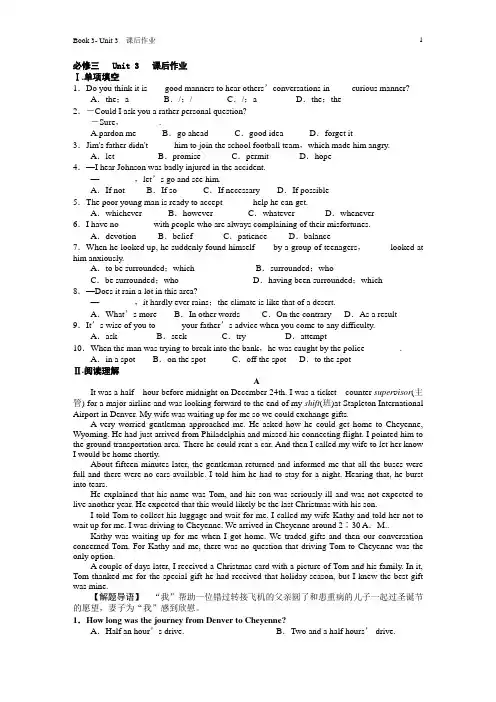
必修三 Unit 3 课后作业Ⅰ.单项填空1.Do you think it is ___ good manners to hear others’conversations in ____ curious manner?A.the;a B./;/ C./;a D.the;the2.-Could I ask you a rather personal question?-Sure,________.A.pardon me B.go ahead C.good idea D.forget it3.Jim's father didn't _____ him to join the school football team,which made him angry.A.let B.promise C.permit D.hope4.—I hear Johnson was badly injured in the accident.—________,let’s go and see him.A.If not B.If so C.If necessary D.If possible5.The poor young man is ready to accept ______ help he can get.A.whichever B.however C.whatever D.whenever6.I have no________with people who are always complaining of their misfortunes.A.devotion B.belief C.patience D.balance7.When he looked up, he suddenly found himself ___ by a group of teenagers,_____ looked at him anxiously.A.to be surrounded;which B.surrounded;whoC.be surrounded;who D.having been surrounded;which 8.—Does it rain a lot in this area?—________,it hardly ever rains;the climate is like that of a desert.A.What’s more B.In other words C.On the contrary D.As a result 9.It’s wise of you to _____ your father’s advice when you come to any difficulty.A.ask B.seek C.try D.attempt10.When the man was trying to break into the bank,he was caught by the police________.A.in a spot B.on the spot C.off the spot D.to the spotⅡ.阅读理解AIt was a half hour before midnight on December 24th. I was a ticket counter super v isor(主管) for a major airline and was looking forward to the end of my shift(班)at Stapleton International Airport in Denver. My wife was waiting up for me so we could exchange gifts.A very worried gentleman approached me. He asked how he could get home to Cheyenne, Wyoming. He had just arrived from Philadelphia and missed his connecting flight. I pointed him to the ground transportation area. There he could rent a car. And then I called my wife to let her know I would be home shortly.About fifteen minutes later, the gentleman returned and informed me that all the buses were full and there were no cars available. I told him he had to stay for a night. Hearing that, he burst into tears.He explained that his name was Tom, and his son was seriously ill and was not expected to live another year. He expected that this would likely be the last Christmas with his son.I told Tom to collect his luggage and wait for me. I called my wife Kathy and told her not to wait up for me. I was driving to Cheyenne. We arrived in Cheyenne around 2∶30 A.M..Kathy was waiting up for me when I got home. We traded gifts and then our conversation concerned Tom. For Kathy and me, there was no question that driving Tom to Cheyenne was the only option.A couple of days later, I received a Christmas card with a picture of Tom and his family. In it, Tom thanked me for the special gift he had received that holiday season, but I knew the best gift was mine.【解题导语】“我”帮助一位错过转接飞机的父亲圆了和患重病的儿子一起过圣诞节的愿望,妻子为“我”感到欣慰。
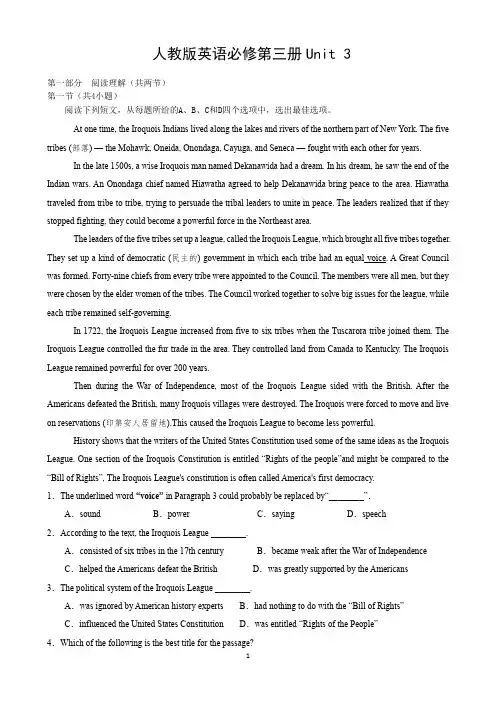
人教版英语必修第三册Unit 3第一部分阅读理解(共两节)第一节(共4小题)阅读下列短文,从每题所给的A、B、C和D四个选项中,选出最佳选项。
At one time, the Iroquois Indians lived along the lakes and rivers of the northern part of New York. The five tribes (部落) — the Mohawk, Oneida, Onondaga, Cayuga, and Seneca — fought with each other for years.In the late 1500s, a wise Iroquois man named Dekanawida had a dream. In his dream, he saw the end of the Indian wars. An Onondaga chief named Hiawatha agreed to help Dekanawida bring peace to the area. Hiawatha traveled from tribe to tribe, trying to persuade the tribal leaders to unite in peace. The leaders realized that if they stopped fighting, they could become a powerful force in the Northeast area.The leaders of the five tribes set up a league, called the Iroquois League, which brought all five tribes together. They set up a kind of democratic (民主的) government in which each tribe had an equal voice. A Great Council was formed. Forty-nine chiefs from every tribe were appointed to the Council. The members were all men, but they were chosen by the elder women of the tribes. The Council worked together to solve big issues for the league, while each tribe remained self-governing.In 1722, the Iroquois League increased from five to six tribes when the Tuscarora tribe joined them. The Iroquois League controlled the fur trade in the area. They controlled land from Canada to Kentucky. The Iroquois League remained powerful for over 200 years.Then during the War of Independence, most of the Iroquois League sided with the British. After the Americans defeated the British, many Iroquois villages were destroyed. The Iroquois were forced to move and live on reservations (印第安人居留地).This caused the Iroquois League to become less powerful.History shows that the writers of the United States Constitution used some of the same ideas as the Iroquois League. One section of the Iroquois Constitution is entitled “Rights of the people”and might be compared to the “Bill of Rights”, The Iroquois League's constitution is often called America's first democracy.1.The underlined word “voice” in Paragraph 3 could probably be replaced by“________”.A.sound B.power C.saying D.speech2.According to the text, the Iroquois League ________.A.consisted of six tribes in the 17th century B.became weak after the War of IndependenceC.helped the Americans defeat the British D.was greatly supported by the Americans3.The political system of the Iroquois League ________.A.was ignored by American history experts B.had nothing to do with the “Bill of Rights”C.influenced the United States Constitution D.was entitled “Rights of the People”4.Which of the following is the best title for the passage?A.The Iroquois League B.The American IndiansC.The culture of the Iroquois D.The United States Constitution答案1-4 BBCA第二节(共5小题)根据短文内容,从短文后的选项中选出能填入空白处的最佳选项。

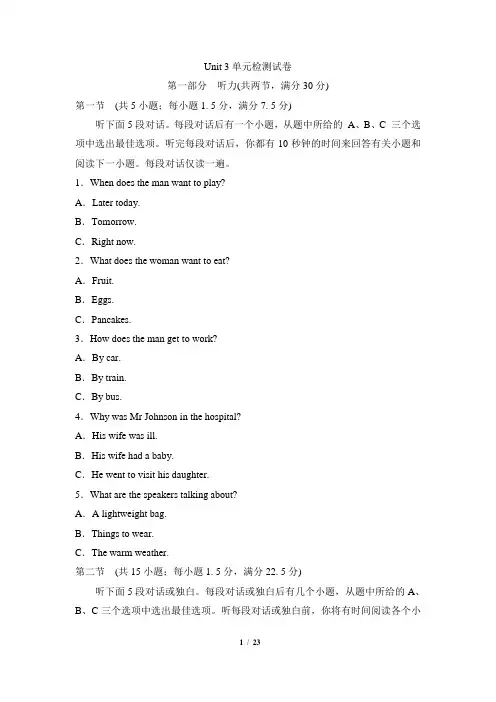
Unit 3单元检测试卷第一部分听力(共两节,满分30分)第一节(共5小题;每小题1. 5分,满分7. 5分)听下面5段对话。
每段对话后有一个小题,从题中所给的A、B、C 三个选项中选出最佳选项。
听完每段对话后,你都有10秒钟的时间来回答有关小题和阅读下一小题。
每段对话仅读一遍。
1.When does the man want to play?A.Later today.B.Tomorrow.C.Right now.2.What does the woman want to eat?A.Fruit.B.Eggs.C.Pancakes.3.How does the man get to work?A.By car.B.By train.C.By bus.4.Why was Mr Johnson in the hospital?A.His wife was ill.B.His wife had a baby.C.He went to visit his daughter.5.What are the speakers talking about?A.A lightweight bag.B.Things to wear.C.The warm weather.第二节(共15小题;每小题1. 5分,满分22. 5分)听下面5段对话或独白。
每段对话或独白后有几个小题,从题中所给的A、B、C三个选项中选出最佳选项。
听每段对话或独白前,你将有时间阅读各个小题,每小题5秒钟;听完后,各小题将给出5秒钟的作答时间。
每段对话或独白读两遍。
听第6段材料,回答第6、7题。
6.What did the woman want to do today?A.Play tennis.B.Go for a run.C.Go to the park.7.How was the weather last weekend?A.Sunny. B.Windy. C.Rainy.听第7段材料,回答第8、9题。
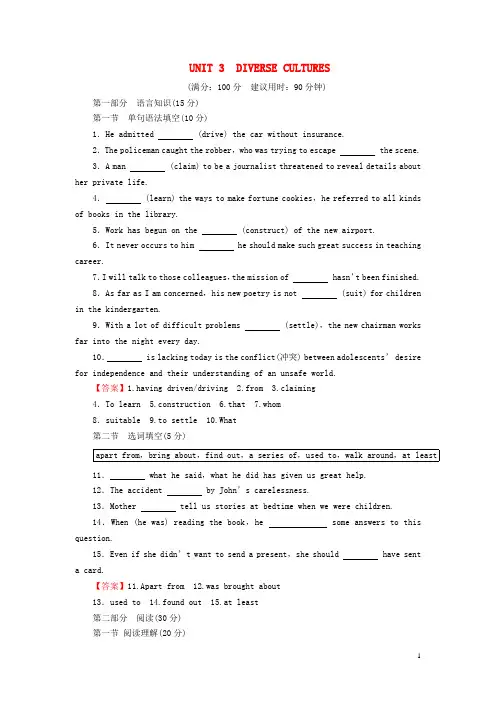
UNIT 3 DIVERSE CULTURES(满分:100分建议用时:90分钟)第一部分语言知识(15分)第一节单句语法填空(10分)1.He admitted (drive) the car without insurance.2.The policeman caught the robber,who was trying to escape the scene.3.A man (claim) to be a journalist threatened to reveal details about her private life.4. (learn) the ways to make fortune cookies,he referred to all kindsof books in the library.5.Work has begun on the (construct) of the new airport.6.It never occurs to him he should make such great success in teaching career.7.I will talk to those colleagues,the mission of hasn’t been finished.8.As far as I am concerned,his new poetry is not (suit) for childrenin the kindergarten.9.With a lot of difficult problems (settle),the new chairman works far into the night every day.10. is lacking today is the conflict(冲突) between adolescents’ desire for independence and their understanding of an unsafe world.【答案】1.having driven/driving 2.from 3.claiming4.To learn 5.construction 6.that 7.whom8.suitable 9.to settle 10.What第二节选词填空(5分)apart from,bring about,find out,a series of,used to,walk around,at least 11. what he said,what he did has given us great help.12.The accident by John’s carelessness.13.Mother tell us stories at bedtime when we were children.14.When (he was) reading the book,he some answers to this question.15.Even if she didn’t want to send a present,she should have senta card.【答案】11.Apart from 12.was brought about13.used to 14.found out 15.at least第二部分阅读(30分)第一节阅读理解(20分)AIf it had not been for Fan Jinshi and her team, the world cultural heritage at Dunhuang Mogao Grottoes in a remote Chinese desert might have long been destroyed by sand, weather and humans.Born and raised in Shanghai, Fan has spent half a century fighting an uphill battle to preserve the ancient Buddhist wall painting at Dunhuang, in Northwest China’s Gansu Province. The 1,651-year-old Dunhuang Mogao Grottoes are a huge collection of Buddhist art—more than 2,000 buddha figures and 45,000 square meters of paintings spread among 735 caves. It is China’s first UNESCO World Heritage Site.Archaeologist Fan was sent to Dunhuang after graduation from Peking University in 1963.While in Dunhuang, a remote village in the desert then, Fan lived in an abandoned temple. At first, she did not even dare to go out to the toilet at night. To protect the treasures from sand and dampness, Fan and other workers put doors on the caves, planted trees and started monitoring temperature and humidity in the caves. They also controlled the number of visitors.In the late 1990s, with tourism booming nationwide since national holidays were extended, the local government planned to go public with(公之于世) Dunhuang Mogao Grottoes, but found Fan firmly in their way. “The heritage would have been destroyed if it had been listed,” she said.Dunhuang Academy has now photographed and cataloged online all the sculptures and paintings. “Despite our efforts to minimize damage, we can’t completely stop them from being eroded.But the digital database will last.”Fan was grateful when her husband joined her in Dunhuang in 1986 after 19 years of separation. Her two sons grew up in Shanghai with their aunt. “I have not been a good mother or wife. With regard to my family, I’m full of guilt,” she said.Fan, 79, retired two years ago as the director of Dunhuang Academy but continues her efforts as a national political adviser.( )16.Which of the following measures didn’t Fan Jinshi take to protect Dunhuang Mogao Grottoes?A.Opening Dunhuang Mogao Grottoes to the public extensively.B.Planting trees and stopping the Dunhuang Mogao Grottoes being eroded.C.Picturing and classifying all the sculptures and paintings online.D.Putting doors on the caves and monitoring temperature and humidity.( )17.What does the underlined phrase “in their way” in Paragraph 4 mean?A.Going to a place.B.Being in favor of something.C.Rejecting something.D.Giving in to something.( )18.What kind of person do you think Fan is?A.Considerate and easy-going.B.Kind and intelligent.C.Humorous and sweet.D.Devoted and persistent.【语篇解读】本文是一篇记叙文,介绍了北大才女、“文物保护杰出贡献者”国家荣誉称号获得者樊锦诗奉献一生守护敦煌莫高窟的故事。
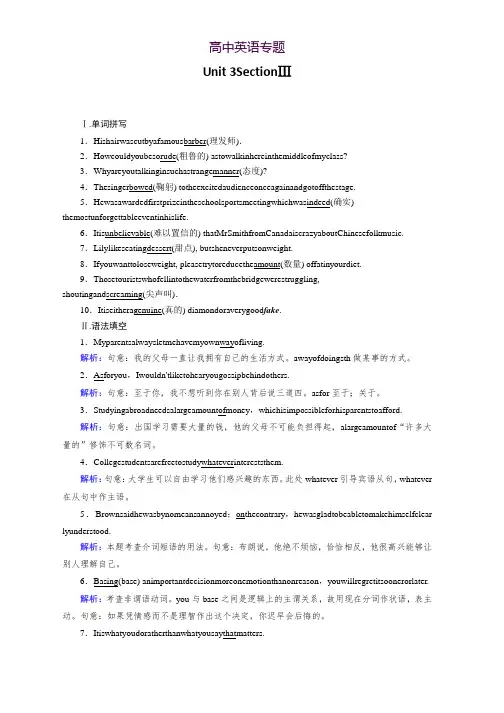
Unit 3SectionⅢⅠ.单词拼写1.Hishairwascutbyafamousbarber(理发师).2.Howcouldyoubesorude(粗鲁的) astowalkinhereinthemiddleofmyclass?3.Whyareyoutalkinginsuchastrangemanner(态度)?4.Thesingerbowed(鞠躬) totheexcitedaudienceonceagainandgotoffthestage.5.Hewasawardedfirstprizeintheschoolsportsmeetingwhichwasindeed(确实) themostunforgettableeventinhislife.6.Itisunbelievable(难以置信的) thatMrSmithfromCanadaiscrazyaboutChinesefolkmusic.7.Lilylikeseatingdessert(甜点), butsheneverputsonweight.8.Ifyouwanttoloseweight, pleasetrytoreducetheamount(数量) offatinyourdiet.9.Thosetouristswhofellintothewaterfromthebridgewerestruggling,shoutingandscreaming(尖声叫).10.Itiseitheragenuine(真的) diamondoraverygood fake.Ⅱ.语法填空1.Myparentsalwaysletmehavemyownwayofliving.解析:句意:我的父母一直让我拥有自己的生活方式。
awayofdoingsth做某事的方式。
2.Asforyou,Iwouldn'tliketohearyougossipbehindothers.解析:句意:至于你,我不想听到你在别人背后说三道四。
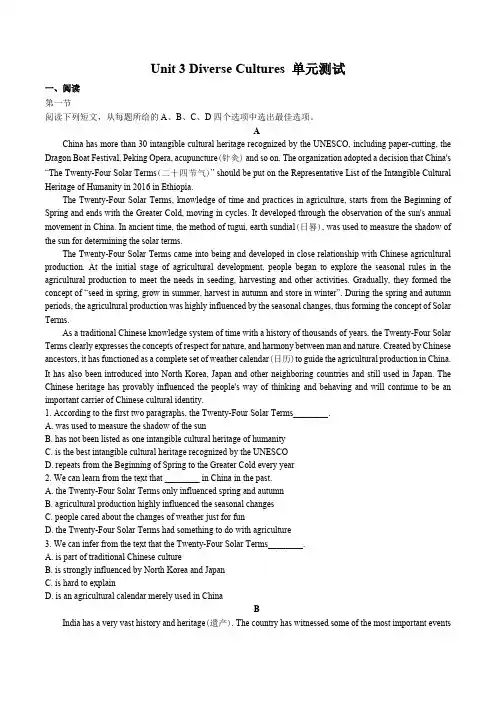
Unit 3 Diverse Cultures 单元测试一、阅读第一节阅读下列短文,从每题所给的A、B、C、D四个选项中选出最佳选项。
AChina has more than 30 intangible cultural heritage recognized by the UNESCO, including papercutting, the Dragon Boat Festival, Peking Opera, acupuncture(针灸) and so on. The organization adopted a decision that China's “The TwentyFour Solar Terms(二十四节气)” should be put on the Representative List of the Intangible Cultural Heritage of Humanity in 2016 in Ethiopia.The TwentyFour Solar Terms, knowledge of time and practices in agriculture, starts from the Beginning of Spring and ends with the Greater Cold, moving in cycles. It developed through the observation of the sun's annual movement in China. In ancient time, the method of tugui, earth sundial(日晷), was used to measure the shadow of the sun for determining the solar terms.The TwentyFour Solar Terms came into being and developed in close relationship with Chinese agricultural production. At the initial stage of agricultural development, people began to explore the seasonal rules in the agricultural production to meet the needs in seeding, harvesting and other activities. Gradually, they formed the concept of “seed in spring, grow in summer, harvest in autumn and store in winter”. During the spring and autumn periods, the agricultural production was highly influenced by the seasonal changes, thus forming the concept of Solar Terms.As a traditional Chinese knowledge system of time with a history of thousands of years, the TwentyFour Solar Terms clearly expresses the concepts of respect for nature, and harmony between man and nature. Created by Chinese ancestors, it has functioned as a complete set of weather calendar(日历)to guide the agricultural production in China. It has also been introduced into North Korea, Japan and other neighboring countries and still used in Japan. The Chinese heritage has provably influenced the people's way of thinking and behaving and will continue to be an important carrier of Chinese cultural identity.1. According to the first two paragraphs, the TwentyFour Solar Terms________.A. was used to measure the shadow of the sunB. has not been listed as one intangible cultural heritage of humanityC. is the best intangible cultural heritage recognized by the UNESCOD. repeats from the Beginning of Spring to the Greater Cold every year2. We can learn from the text that ________ in China in the past.A. the TwentyFour Solar Terms only influenced spring and autumnB. agricultural production highly influenced the seasonal changesC. people cared about the changes of weather just for funD. the TwentyFour Solar Terms had something to do with agriculture3. We can infer from the text that the TwentyFour Solar Terms________.A. is part of traditional Chinese cultureB. is strongly influenced by North Korea and JapanC. is hard to explainD. is an agricultural calendar merely used in ChinaBIndia has a very vast history and heritage(遗产). The country has witnessed some of the most important eventsin the past and every event has an effect of its own on the culture, religion, lifestyle, and economy of the country. This is one of the leading reasons why tourists prefer India to travel and explore. Historical tours in India provide everything that a traveller expects from his/her journey. These historical tours give an opportunity to study and explore Indian history.Here are some of the historical travel packages:Forts(堡垒) and palacesThe rich cultural past of India is showed in the countless forts and palaces across the country. Most of the forts were constructed to keep the enemy away and palaces were made on the names of the kings and queens. Some of the famous forts and palaces are: Agra Fort (Agra), Fatehpur Sikri (Agra), Hawa Mahal (Jaipur), Amber Fort (Jaipur), City Palace (Jaipur), Gwalior Fort (Gwalior), Mysore Palace (Mysore), Red Fort (Delhi), etc.India heritage toursThe main purpose of India heritage tours is to make Indians as well as tourists familiar with the rich Indian heritage. The heritage of the country is at least 5,000 years. Some of the heritage tours are: medieval heritage, Rajput heritage, Golden Triangle, splendid Gujarat, etc.South India historical toursSouth India is known for its diversity and there are many places, which attract tourists, not only from the country but also from all around the world. The famous tourist destinations in South India include Goa, Cochin, Kerala, Munnar, Periyar, Kottayam and the list goes on and on.4. What is the main purpose of this passage?A. To tell us how to explore the history of India.B. To introduce some historical tours about India.C. To help study the culture and history of India.D. To report some important events in Indian history.5. What attracts tourists to explore India?A. Its cheap and rich products.B. Its famous kings and queens.C. Its historical culture and heritage.D. Its beautiful natural scenery.6. For what reason were most forts built?A. To honour the kings.B. To act as a palace for queens.C. To defend the country or the city.D. To attract more tourists.7. What can we know about Rajput heritage?A. It is a famous fort in India.B. It is one of the heritages in India.C. It has a long history of 500 years.D. It lies in South India.CA 9yearold boy in Indiana stopped a would-be carjacker(劫车贼)on Christmas Day from running away with his father's truck.Kevin Cooksey was inside the One Stop Express gas station in Kokomo buying medicine for his wife when a man jumped into the driver's seat of his truck. Cooksey had left the engine running and the door unlocked.“When I saw my truck door open, I was like, ‘Oh my God, what am I going to tell my wife?’” Cooksey said.His son, Larry, was sitting in the back seat. “As soon as he opened the door, I got frightened,” said Larry. “So I pulled out the gun and pointed it to his head.”This was enough to make the carjacker think twice and he jumped out of the truck to try another car. Parked beside Cooksey's truck was Kyle Sparling's black Trailblazer. He also had left the engine running as he went into the store. The man got in Sparling's SUV and took off.“I didn't know what to think. I just kind of ran outside and watched him,” said Sparling.As the man sped off, Cooksey told Sparling to get into his truck and the two men began to run after him. The icy winter conditions made the driving difficult, but the pair followed at a safe distance as the carjacker drove in a “Z” way. After a few miles, the carjacker knocked into the sign of a local business, American Tool and Party Rental. Cooksey and Sparling called police to the place.The police put 32yearold Ollie Dunn into prison. Sparling's car was damaged in the wheel, and the windscreen got cracked after the sign fell on it. “I was just glad he didn't knock into anybody,” Sparling said. “That was my biggest fear, I think.”8. How did Larry stop the carjacker?A. He hit him with a gun.B. He begged him to stop.C. He cried for others' help.D. He frightened him away with a gun.9. Why could the carjacker easily drive away the SUV?A. The carjacker broke into it.B. It was parked in the wrong place.C. Nobody was in but the engine was on.D. The driver went to buy medicine for his wife.10. What ended the carjacker's escape?A. The police stopped him.B. His driving ability was very poor.C. The SUV got damaged in an accident.D. Cooksey and Sparling caught up with him.11. What does the underlined word “That” in the last paragraph refer to?A. Spraling's car was stolen.B. Sparling's car was damaged.C. The carjacker might run away.D. The carjacker might hurt somebody.DDuring the mid1960s, Vinh Linh, Quang Tri in Vietnam was a wasteland, which was often under attack from the US air force. Vietnamese soldiers who were fighting against the US discussed how to make people there safe. Some suggested moving the people underground. Then they began to build a tunnel(隧道).The Vinh Moc tunnel was built for the people of Son Trung and Son Ha in Vinh Linh county of Quang Tri Province. It was built in several stages, beginning in 1966and was in use until 1971. It grew to include wells, kitchens, rooms for each family and hospitals. Around 60 families lived in the tunnel.Deep under the ground, hidden from soldiers, people lived in the tunnel for many years. They survived. The tunnel was a success and no villagers lost their lives thanks to it.During that time, 17children were born in the tunnel, each of whose lives was a proof that the tunnel was effective in protecting the villagers. As time goes by, it has become both a historical site and a tourist attraction forpeople wishing to learn about a heroic period in Vietnam's history.The total length of the tunnel network is nearly 2km, and has three floors. It was built over two years. The two sides have small houses every 3m. The tunnel center has a 150seat hall, a hospital and maternity rooms(产房). It is linked to the sea by seven exits, which also function as ventilators(通风设备), and to a nearby hill by another six.People wanting to know about the Vietnam War should have some knowledge of the tunnel network in Quang Tri. The tunnel network shows the wisdom and bravery of the local people in their fight for their identity.Ten years after the war ended, the Vinh Moc tunnel was opened to tourists. These days, the government is working to protect the historical relic.12. Which of the following statements is NOT true according to the passage?A. During the mid1960s, Vietnam was at war with the US.B. Vinh Linh, Quang Tri in Vietnam was an undeveloped place.C. Soldiers built the tunnels as hiding places for villagers there.D. Some people in the tunnel suffered much and died during the 1960s.13. The villagers living in the tunnels were ________ during those years.A. awfulB. safeC. poorD. generous14. According to the passage, the Vinh Moc Tunnel ________.A. is nearly 2km in length with bad ventilationB. had been built for 7years before it came into useC. is a place that shows the bravery of the local peopleD. was first built as a base for the Vietnamese army15. What is the best title for the passage?A. How to protect the Vinh Moc tunnelB. A painful memory of the Vietnam WarC. The wisdom and bravery of the VietnameseD. The Vinh Moc tunnel—a famous historical relic in Vietnam第二节阅读下面短文,从短文后的选项中选出可以填入空白处的最佳选项,选项中有两项为多余选项。
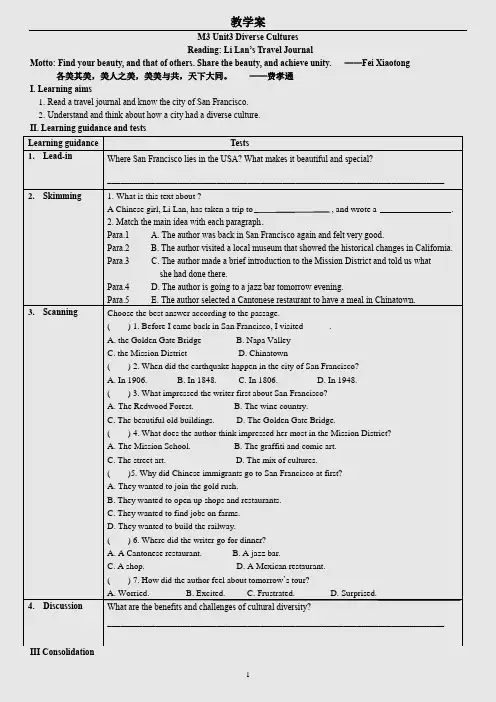
M3 Unit3 Diverse CulturesReading: Li Lan’s Travel JournalMotto: Find your beauty, and that of others. Share the beauty, and achieve unity. ——Fei Xiaotong 各美其美,美人之美,美美与共,天下大同。
——费孝通I. Learning aims1.Read a travel journal and know the city of San Francisco.2.Understand and think about how a city had a diverse culture.II. Learning guidance and testsLearning guidance Tests1.Lead-in Where San Francisco lies in the USA? What makes it beautiful and special?_____________________________________________________________________________2.Skimming 1.What is this text about ?A Chinese girl, Li Lan, has taken a trip to , and wrote a .2. Match the main idea with each paragraph.Para.1 A. The author was back in San Francisco again and felt very good.Para.2 B. The author visited a local museum that showed the historical changes in California.Para.3 C. The author made a brief introduction to the Mission District and told us whatshe had done there.Para.4 D. The author is going to a jazz bar tomorrow evening.Para.5 E. The author selected a Cantonese restaurant to have a meal in Chinatown.3.Scanning Choose the best answer according to the passage.( ) 1. Before I came back in San Francisco, I visited______.A. the Golden Gate BridgeB. Napa ValleyC. the Mission DistrictD. Chinatown( ) 2. When did the earthquake happen in the city of San Francisco?A. In 1906.B. In 1848.C. In 1806.D. In 1948.( ) 3. What impressed the writer first about San Francisco?A. The Redwood Forest.B. The wine country.C. The beautiful old buildings.D. The Golden Gate Bridge.( ) 4. What does the author think impressed her most in the Mission District?A. The Mission School.B. The graffiti and comic art.C. The street art.D. The mix of cultures.( )5. Why did Chinese immigrants go to San Francisco at first?A. They wanted to join the gold rush.B. They wanted to open up shops and restaurants.C. They wanted to find jobs on farms.D. They wanted to build the railway.( ) 6. Where did the writer go for dinner?A. A Cantonese restaurant.B. A jazz bar.C. A shop.D. A Mexican restaurant.( ) 7. How did the author feel about tomorrow’s tour?A. Worried.B. Excited.C. Frustrated.D. Surprised.4. Discussion What are the benefits and challenges of cultural diversity?_____________________________________________________________________________III ConsolidationLevel A Summary Today, I arrived back in San Francisco, and it feels good (1)_________ (be) back in the city again. The city succeeded in (2)_________ (rebuild) itself after the earthquake that (3)_________ (occur) in 1906, and I stayed in the Mission District, enjoying some delicious noodles mixed with cultures.In the afternoon, I headed to a local museum (4)_________ showed the historical changes in California. During the gold rush, many Chinese arrived, and some opened up shops and restaurants in Chinatown to earn a (5)_________(live). Many others worked on (6)_________ (farm), joined the gold rush, or went to build the railway that connected California to the east. The museum showed us (7)_________America was built by immigrants from (8)_________(difference) countries and cultures.In the evening, I went to Chinatown, and ate in a Cantonese restaurant that served food on (9)_________(beauty) china plates. Tomorrow evening, I’m going to (10)_________ jazz bar in the Richmond District.Level B 阅读七选五Small talk is a short conversation we have at parties, while we wait in line in a store, at family events or work. Sometimes we make small talk with people we know but not well. Often we have to make small talk with completestrangers. ______. Here are some tips to improve your ability to make small talk._______If you have seen a really good movie or have read a really good book, you can talk about that.When you are sharing the same experience with someone, it’s easy to start a conversation. You simply notice and comment on what ’s going on around you. For example, if you are at a party and a song comes on that you like or that reminds you of something, you can talk about that.Ask open -ended questions.These types of questions require more thought and more than a simple yes or no answer. _______, the conversationwill go on longer.Become a student.Nobody knows everything. So, as someone is answering one of your open -ended questions, they bring up somethingabout which you know nothing. So tell them! This lets the other person become the teacher. _______. It’s a win -winsituation.Like anything, being good at making small talk takes practice._______, you may find it easy. If you make small talkusing English, you will definitely improve your speaking and listening skills.A. Have some conversation starters ready.B. However, some people are not good at small talk.C. If you make small talk in your native language.D. If you ask questions that need more details to answer.E. You can talk about something that you recently learned.F. Many people find these small conversations about random topics easy.G. They feel good about sharing their knowledge and you get to learn something.1 2 3 4 5。
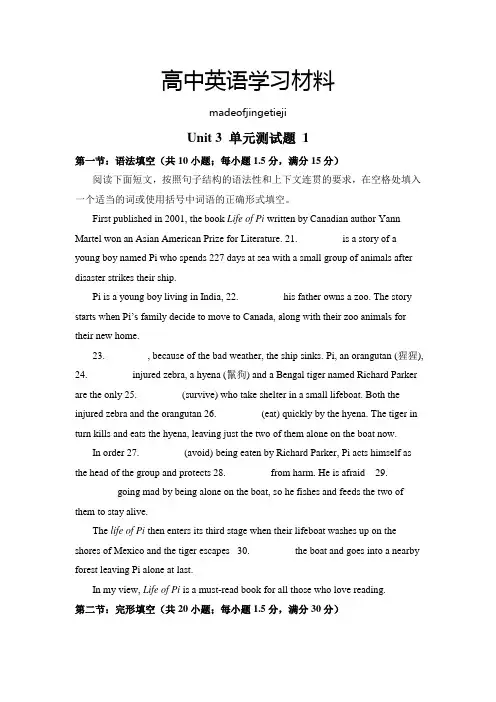
高中英语学习材料madeofjingetiejiUnit 3 单元测试题1第一节:语法填空(共10小题;每小题1.5分,满分15分)阅读下面短文,按照句子结构的语法性和上下文连贯的要求,在空格处填入一个适当的词或使用括号中词语的正确形式填空。
First published in 2001, the book Life of Pi written by Canadian author Yann Martel won an Asian American Prize for Literature. 21. ________ is a story of a young boy named Pi who spends 227 days at sea with a small group of animals after disaster strikes their ship.Pi is a young boy living in India, 22. ________ his father owns a zoo. The story starts when Pi’s family decide to move to Canada, along with their zoo animals for their new home.23. ________, because of the bad weather, the ship sinks. Pi, an orangutan (猩猩),24. ________ injured zebra, a hyena (鬣狗) and a Bengal tiger named Richard Parker are the only 25. ________ (survive) who take shelter in a small lifeboat. Both the injured zebra and the orangutan 26. ________ (eat) quickly by the hyena. The tiger in turn kills and eats the hyena, leaving just the two of them alone on the boat now.In order 27. ________ (avoid) being eaten by Richard Parker, Pi acts himself as the head of the group and protects 28. ________ from harm. He is afraid 29.________ going mad by being alone on the boat, so he fishes and feeds the two of them to stay alive.The life of Pi then enters its third stage when their lifeboat washes up on the shores of Mexico and the tiger escapes 30. ________ the boat and goes into a nearby forest leaving Pi alone at last.In my view, Life of Pi is a must-read book for all those who love reading.第二节:完形填空(共20小题;每小题1.5分,满分30分)阅读下面短文,从短文后各题所给的四个选项(A、B、C和D)中,选出可以填入空白处的最佳选项。
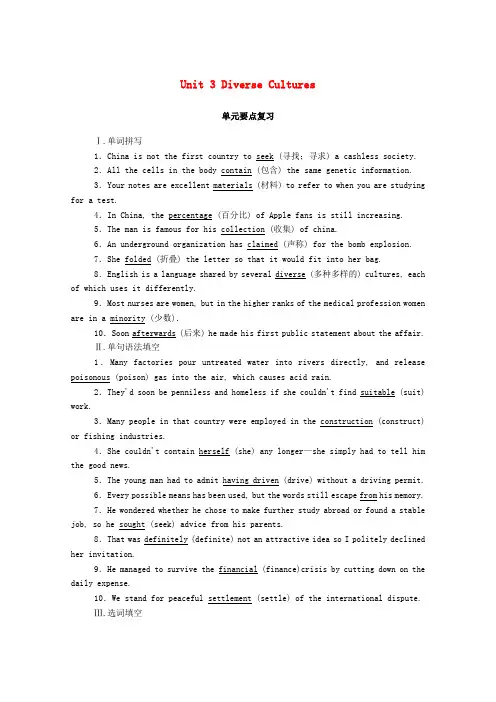
Unit 3 Diverse Cultures单元要点复习Ⅰ.单词拼写1.China is not the first country to seek (寻找;寻求) a cashless society.2.All the cells in the body contain (包含) the same genetic information.3.Your notes are excellent materials (材料) to refer to when you are studying for a test.4.In China, the percentage (百分比) of Apple fans is still increasing.5.The man is famous for his collection (收集) of china.6.An underground organization has claimed (声称) for the bomb explosion.7.She folded (折叠) the letter so that it would fit into her bag.8.English is a language shared by several diverse (多种多样的) cultures, each of which uses it differently.9.Most nurses are women, but in the higher ranks of the medical profession women are in a minority (少数).10.Soon afterwards (后来) he made his first public statement about the affair.Ⅱ.单句语法填空1.Many factories pour untreated water into rivers directly, and release poisonous (poison) gas into the air, which causes acid rain.2.They'd soon be penniless and homeless if she couldn't find suitable (suit) work.3.Many people in that country were employed in the construction (construct) or fishing industries.4.She couldn't contain herself (she) any longer—she simply had to tell him the good news.5.The young man had to admit having driven (drive) without a driving permit.6.Every possible means has been used, but the words still escape from his memory.7.He wondered whether he chose to make further study abroad or found a stable job, so he sought (seek) advice from his parents.8.That was definitely (definite) not an attractive idea so I politely declined her invitation.9.He managed to survive the financial (finance)crisis by cutting down on the daily expense.10.We stand for peaceful settlement (settle) of the international dispute.Ⅲ.选词填空He wants me to settle down, but now I want to find an adventure.2.The heavy spring rains brought about the flood.3.It is out of the question to finish a series of tasks in such a short time.4.A tall building was put up where there used to be a desert.5.These people earn a living for their professional knowledge and skills.6.There are schools of medicine,business,design,law,public policy, to name but a few.7.Apart from some spelling mistakes, the composition is fairly good.8.The president visited the area to see the devastation at first hand.9.The film is wonderful and is suitable for children.10.They are not local here, and they left hometown to seek their fortune.Ⅳ.完成句子1.Now there are many young men in our society dreaming of making a fortune without hard work.现在有很多年轻人梦想不通过劳动就发大财。
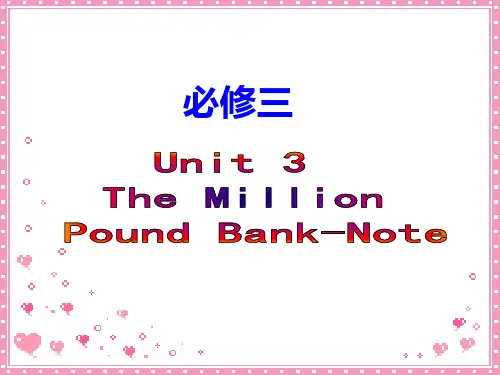
人教2019新版选择性必修三•Unit 3一、词汇短语精练:用所给词的适当形式填空。
1. Millions will face________(starve) next year as a result of the drought.【答案】starvation【解析】考查名词。
句意:由于干旱,明年将有数百万人面临饥饿。
分析句子可知,空处位于动词后面,名词做宾语,不可数名词starvation (饥饿)。
故填starvation。
2. This TV series is intended to convey family value to the viewers that the conflict can be solved by ________(tolerate), understanding and love.【答案】tolerance【解析】考查名词。
句意:这部电视剧旨在向观众传达家庭价值观,即通过宽容、理解和爱可以解决冲突。
用抽象名词tolerance和后面的抽象名词understanding and love作并列宾语。
故填tolerance。
3. On top of that, most of the 3D food printers now __________ (restrict) to dry ingredients, because meat and milk products may easily go bad.【答案】are restricted【解析】考查时态语态。
句意:最重要的是,现在大多数3D食品打印机只能打印干食材,因为肉类和奶制品很容易变质。
主语与谓语构成被动关系,描述目前的情况应用一般现在时的被动语态,主语为most of the 3D food printers,谓语用复数。
故填are restricted。
4. I resolved ___________ (seize) this opportunity and spend a good deal of time there.【答案】to seize【解析】考查不定式。
M3unit3Ⅰ.单词荟萃1.________n.出生地;故乡→________n.出生2.________n.小说;长篇故事→________n.小说家3.___________n.冒险→________ n.冒险家→________ adj.冒险的4.________ n.商人→________n.生意;商业5.________n.耐心→________adj.耐心的→________ adv.耐心地→________n.病人6.________vi.漫游;漫步;漂泊7.________vt. & vi.许可;允许→________ n.允许8.________vi.凝视;盯着看9._______vi.发现;认出→_______(过去式)→_______(过去分词) 10.________vt.寻找;探索→________ (过去式)→________ (过去分词)11.________adj.难以置信的→________vt.可信→________n.信仰→________adj.可信的12.________adj.粗鲁的;无礼的→________n. 粗鲁→________adv.粗鲁地Ⅱ.短语检测1.偶然地;意外地_________________2.衣衫褴褛__________________3.前进;往下说______________ 4.盯着看________________________5.导致;做出解____________ 6.与此相反,正相反_____________________7.冒险____________ 8.至于;关于_________________________9.打赌____________ 10.养育;抚养____________III、完成句子1.事实上,当他进入办公室时是偶然被保安发现的。
2.很多人去大城市追求幸福和成功而我想碰碰运气,在家乡开个公司。
单元综合检测3必修三第分)分,满分15I. 单项填空(共15小题;每小题1quarter earlier a wondering if I could leave 1.——Excuse me, Professor Smith, I wastoday.________. ——B. Nothing the matter. A. Sure, go aheadD. Of course, no problem.C. Oh, why not?His wife is constantly finding ________ with him, which makes him very angry. 2. D. flaw B. shortcomings A.errors C.fault.I'll look into the matter as soon as possible. Just have a little ______.3rest D.C.patience A.wait B.timeThis painting is splendid, but _______ we actually need it is a different matter. 4.D. howC. whether B. what A. thatwas man's life position, a young his resolution in opposing the other jurors' 5..___saved. C.Thankful toD.Thanks toA.Since B.As for6.—Why can't I smoke here?At no time _________ in the meeting room.— B. smoking is permitted A. is smoking permittedD. smoking does permitC. does smoking permitlecture?What do you think of last night's 7.—______ speaking, I thought it was rather boring —D. HonestlyA. RealB. GeneralC. Fair8.Now he has _________money, and can do anything he wants to.a great many of .BA.a great number ofa good plenty ofD.C.a large amount ofWe decided to ___________ a chance on the weather and have the party outdoors. .9 D. pick A. make B. take C. havesupportto find can they work _______ doing seen are students college Some .10themselves.D. no matter whatA. that C. whateverB. whichthe question is _______ you are prepared to—Your ability has never been in doubt .11work hard.D. how A. that B. whether C. ifShe has been working hard day and night, which of course, _______ her pale face.12.B. stands for C. goes for D. answer forA. accounts for._______'s discovery of the “New World”took place Columbus.13.A. on purposeB. by accidentC. by heartD. by mistake14.His parents died in the strong earthquake, so he was _____ in the SOS Village.A. grown upB. taken up D. brought upC. fed up15.He is said to be very wealthy, but I don't understand why he always _______.A. in uniformB. in fashionC. in troubleD. in ragsⅡ. 单词拼写16.Yesterday I made a b_________ on who will get the first prize.17. It was the first time for Lily to go abroad, which was a real ________(冒险).18. It is bad m__________ to spit in pubilc.19. Yang Liwei had never thought he would get the chance to w_________in space.20. Don't be s_______. What you say is impossible.21. David gave us a vivid ________(描述) of his trip to California.22. I easily __________(认出) him in the crowd because he was very tall.23. Weather __________(允许),we will go out to climb the hill.24. Don't be __________(粗鲁的) to the taxi driver. It is not his fault that traffic is heavy.25. The twins look alike but have very different __________(性格).III. 阅读理解(共20 小题;每小题2分,满分40分)Mark Twain left school when he was twelve. He had little school education.In spite of this, he became the most famous writer of his time. He made millions of dollars by writing. His real name was Samuel Langhorne Clemens, but he is better known all over the world as Mark Twain, his penname.Mark Twain was born in 1835 and he was not a healthy baby. In fact, hewas not ex-pected to live through the first winter. But with his mother's care, he managed to survive. As a boy, he caused much trouble for his parents. He used to play jokes on all his friends and neighbors. He didn't like to go to school, and he often ran away from home. He always went in the direction of the nearby Mississippi(密西西比河). He was nearly drowned nine times.After his father's death, Mark Twain began to work for a printer, who only provided him with food and clothing. Then, he worked as a printer, a river-boat pilot and later joined the army. But shortly after that he became a miner. During this period, he started to write short stories. Afterwards he became a full time writer.In 1870, Mark Twain got married. In the years that followed he wrote many books including Tom Sawyer in 1876, and Huckleberry Finn in 1884, which made him famous, and brought him great fortune.) and he投资Unfortunately, Mark Twain got into debts in bad investments(had to write large numbers of stories to pay these debts. In 1904, his wife died, and then three of his children passed away.At the age of 70, his hair was completely white. He bought many white suits and neckties. He wore nothing but white from head to foot until his death on April 21, 1910.26.In his childhood, Mark Twain, ________.A.learned a lot at schoolB.he often went swimming with other boysC.his mother often worried about his safetyD.he often played games with other boys27.Which of the following shows the right order about Mark Twain?a. He became a miner.b. He worked as a printer.c. He got into debts.d. His father died.e. He became a full-time writer. F. He joined the army.A. a—d—b—c—e—fB. d—b—f—a—e—cC. d—a—f—e—b—cD. c—b—d—f—e—a28.In order to make a living, Mark Twain _______.A.first worked as a printerB.did many kinds of workC.wrote stories in the beginningD.joined the army after he worked in a mine29.From the passage we can see that Mark Twain _______.A.had a happy childhoodB.was a good boy and always did what he was askedC.was very naughty when he was youngD.lived a pleasant life30.Before his death, Mark Twain _______.A. became a white manB. was in low spiritsC. liked to buy all kinds of clothesD. had nothing onⅡ.阅读表达(共5小题,每小题3分,满分15分)【原创】An allowance(零用钱)is an important tool for teaching kids how to budget (预算), save and make their own decisions. Children remember and learn from mistakes when their own dollars are lost or spent foolishly.How large an allowance is appropriate(合适的)?Experts say there is notright amount. Actual amounts differ from area to area, and from family to family.To set an appropriate allowance for your child, work up a weekly budget.) such as movies and snack. Next,花费Allow for entertainment expenditures(include everyday expenses such as lunch money, bus fare, school supplies. “Ifyou make the child responsible for these bills,”says Josephine Swanson, a consumer specialist, “he or she will learn to budget for necessary expenditures.”It can be tough, but avoid excusing your children when they __________with their allowance. When Brooke Stephens was ten and growing up in Jacksonville, her mother gave her $5 a week,$1.75 of which was for bus fare and lunch. “If you lose money,”Brooke's mother told her, “you walk home.”One week the girl spent all her allowance in a candy store, and then she called home for a ride. “Mom made me walk home,”recalls Stephens, now afinancial planner in Brooklyn. “At first I was angry. But I finally realized that shewas trying to teach me an important lesson.”Experts advise an allowance should not be tied directly to a child's daily chores(琐事). Kids should help around the house not because they get paid forit but because they share responsibilities(责任) as members of family. You might, however, pay a child for doing extra jobs at home. That can develop his or her initiative(主动性).31.What is the best title of the passage? (Please answer within 10 words)______________________________________________________________ ______________32.Fill in the blank in Paragraph 4 with a proper sentence. (Within 10 words)______________________________________________________________ ______________33.What advice is given in the last paragraph? (Within 10 words)______________________________________________________________ ______________34.For what purpose does the author mention Brooke Stephens in Paragraph4? (within 20 words)______________________________________________________________ ______________35.Translate the underlined sentence in the last paragraph into Chinese.______________________________________________________________ ______________may./ you please./ Of course, 本题考查交际用语,表示许可时,肯定回答常用“Yes, 1.A选项)D(表邀请答语help yourself.”等表示。